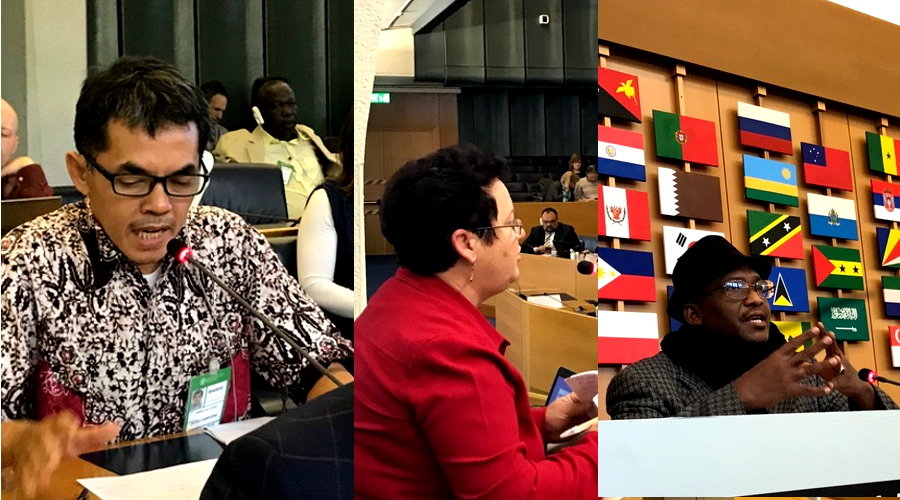The time has come to scale up Peasant Agroecology: La Via Campesina at the II International Agroecology Symposium of FAO

Peasants and other small-scale producers of food are central to bringing agroecology to scale, FAO Director-General José Graziano da Silva stressed in his closing remarks to the II International Agroecology Symposium at FAO held from 3 to 5 of April of 2018 in Rome.
“It’s time to scale up the implementation of agroecology,” Graziano da Silva said. “We have succeeded in moving from talking about what is agroecology, to now having specific targets to be achieved in the next few years, with strong support from civil society and those governments who have worked hard to make this symposium a success,” he added.
“When we speak of agroecology, we are not speaking of strictly technical matters. I would like to stress on the social aspect as well. So when we say that we are going to strengthen the role of agroecology in FAO’s work, we are saying that we are going to strengthen the role of family and small-scale farmers, fisher folk, pastoralists, women and youth,” he said. These comments marked a significant step forward by FAO, notable in the change of the tenor of the words of the DG from a meeting with civil society before the official inauguration, to his statement at the end.
The Symposium brought together more than 700 participants with representatives from 72 governments, around 350 civil society and other non-governmental groups, and 6 UN organizations. 15 delegates from La Via Campesina in Africa, Asia, the Americas, Europe and the Middle East/North Africa participated.
In the summary document read out on the last day, the Symposium Chair Braulio Ferreira de Souza Dias stressed, “Agroecology offers multiple benefits, including for increasing food security and resilience, boosting livelihoods and local economies, diversifying food production and diets, promoting health and nutrition, safeguarding natural resources, biodiversity and ecosystem functions, improving soil fertility and soil health, adapting to and mitigating climate change, and preserving local cultures and traditional knowledge systems”. The official document goes further, calling for “transformative change towards sustainable agriculture and food systems based on agroecology,” change “that respects, protects and fulfills farmers’ rights and access to productive resources such as land, water and seeds.” FAO used the Symposium to launch a ten-year Initiative on Scaling Up Agroecology, though the contents and governance of the initiative remain vague, and our organizations must closely accompany this initiative to assure that in benefits peasants rather than just support the “greenwashing” of the private sector.
Nevertheless, the conclusions of the Symposium strongly echo the civil society declaration also read in the closing session, collectively written by the delegations of La Via Campesina (LVC), the International Planning Committee for Food Sovereignty (IPC), and other organizations of civil society. The positive conclusions are a testament to the work of these civil society delegations, who took on the central messages proposed by LVC and IPC, and used every opportunity to hammer them home, whether in plenary speeches, panels or interventions from the floor. A central message was against attempts by agribusiness to co-opt agroecology and “greenwash” otherwise destructive practices and relations of power, and, that “without our Peoples, there is no agroecology.”
In her plenary address, Rilma Román of ANAP (LVC-Cuba) told the story of how one half of the peasants in Cuba have become agroecological, a success story of scaling up, from which she concluded that “there can be no scaling up of agroecology without social organizations in our territories.” In one of the panels, Ibrahima Coulibaly of CNOP (LVC-Mali) denounced rampant corporate land grabbing, saying that “unless peasants have access to land, we cannot speak of agroecology.” He also roundly criticized government corruption, noting that there are “many policies that sound great on paper, but which never reach the ground.”
In another panel, Ashlesha Khadse of KRRS (LVC-India) explained how LVC peasant agroecology schools, like Amrita Bhoomi in Karnataka, India, prepare peasant youth to facilitate collective processes to scale agroecology in peasant territories, and that beyond technical training, they also receive political formation for the fight to defend communities and territories from land grabbing. Peter Rosset, technical support staff of LVC International and professor at ECOSUR in Mexico, summarized the results of LVC self-study processes, as well as of the Research Group on Massifying (scaling-up) Agroecology at ECOSUR, both of which identify peasant protagonism, social organization in peasant territories, and horizontal methodologies like campesino a campesino (peasant to peasant) as keys to successful cases of scaling up peasant agroecology.
In the final document from the Symposium, it was clear that these as well as the many interventions from the floor by LVC and other civil society delegates, and by allied academics like SOCLA from Latin America, for example concerning the central role of women peasants in agroecology, made their mark. The challenge now will be to use the results of the Symposium to fight for public policies to support peasant agroecology rather than corporate greenwashing, in each of our countries.
